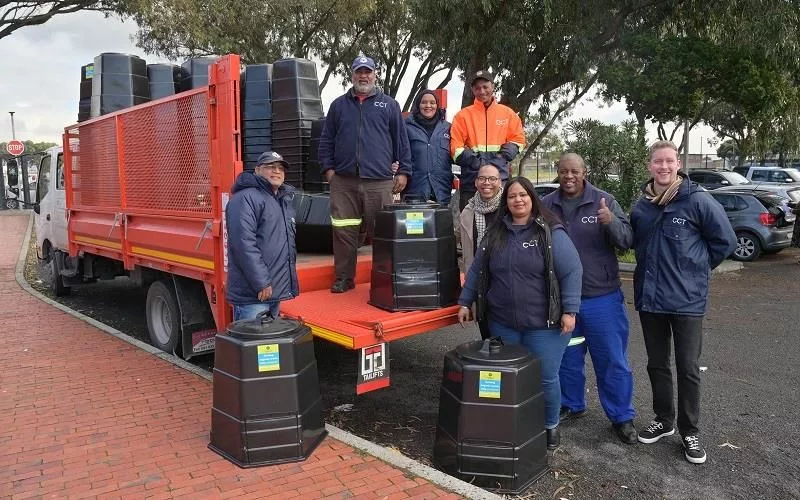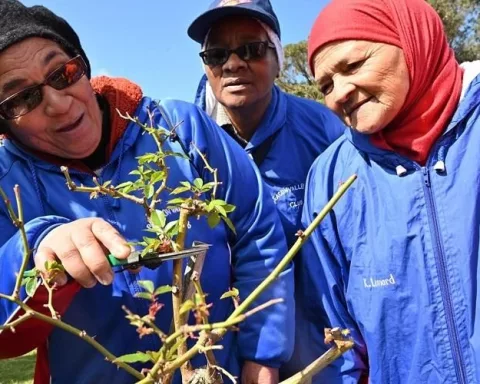Cape Town is taking a proactive approach to combat global environmental issues by initiating community involvement during International Compost Awareness Week. The aim is to educate people about the consequences of uncontrolled organic waste disposal and to distribute home composting containers to inspire personal accountability. Citizens are encouraged to join in building a sustainable future by reducing food waste through mindful meal planning, correct storage, and repurposing leftovers. This initiative reflects a city adopting its duty of climate change and encouraging its residents to do the same.
Cape Town takes a proactive approach to combat global environmental issues. The city initiates community involvement during International Compost Awareness Week. The aim is to educate people about the consequences of uncontrolled organic waste disposal and to distribute home composting containers to inspire personal accountability. Citizens are encouraged to join in building a sustainable future by reducing food waste through mindful meal planning, correct storage, and repurposing leftovers. This initiative reflects a city adopting its duty of climate change and encouraging its residents to do the same.
An Active Response to Global Environmental Crises
Amid mounting international environmental issues, Cape Town city takes a forward-thinking position by initiating a series of community involvement activities during International Compost Awareness Week. The motivation behind this initiative is the worrisome surge of organic waste accumulating in landfills, which seeks to alert the inhabitants of Cape Town to the urgency of combating the organic waste crisis.
The environmental scheme begins on May 6, 2024, and wraps up on May 11, 2024, offering more than mere awareness – it provides a practical educational journey. The City of Cape Town aims to shed light on the severe consequences of uncontrolled organic waste disposal. By underscoring the environmental implications, including the growth of greenhouse gas emissions, these sessions seek to develop a holistic understanding of the connection between organic waste and climate change.
Foster Change: A Practical Initiative
In a bid to inspire palpable change, the City plans to distribute 250 home composting containers during each session. These sturdy containers are intended to inspire residents to accept personal accountability for their waste. By composting at home, citizens can lower their carbon footprint and redirect significant quantities of organic waste away from landfills, playing a part in the city’s broader environmental objectives.
Alderman Grant Twigg, a Mayoral Committee Member for Urban Waste Management, is a fervent supporter of this initiative. He trusts in the effectiveness of community involvement in resolving the organic waste crisis. He asserts that the sessions are designed to provide people with the tools and knowledge needed to contribute positively to the environment. Twigg underscores the influence each person can have in alleviating the detrimental effects of organic waste disposal through simple habits like home composting.
Encouraging Involvement: Community Engagement Sessions
The community engagement sessions, open to all members of the public, will take place at Parow Park boardroom and Harmony Park boardroom. Citizens are encouraged to join in the mission to tackle the organic waste crisis and help build a sustainable future for the coming generations.
For those who cannot obtain a free home composting container, they are easily accessible at garden centres, hardware stores, or online retail platforms. However, even without a composting container, there are still various ways for residents to help reduce food waste.
Reducing Food Waste: Practical Tips
Primarily, viewing food as a valuable resource rather than discardable goods can result in less waste. Mindful meal planning, centered around considerate shopping lists, can avoid over-purchasing and ensure efficient usage of ingredients. Correct storage of perishable goods, using sealed containers and refrigerators, can prolong their usability, while innovative cooking can repurpose leftovers into fresh meals. Serving only the amount of food one intends to eat is another effective way to avoid waste.
It’s crucial to distinguish between ‘Best before’ and ‘Expiry’ dates on food items. The former refers to the product’s peak quality period, while the latter indicates the final day it is safe to eat. Finally, backing food redistribution programs such as local food banks and community organizations can help direct excess food to those in need, fighting hunger, and lessening the environmental impact.
The Fight Against Organic Waste: Cape Town’s Commitment
As Cape Town city rallies its residents for this environmental mission, the officials have already begun preparing compost bins for distribution. This scheme is an essential stride towards creating a sustainable city and confronting an organic waste emergency. It is a reflection of a city adopting the duty of climate change and encouraging its residents to follow suit.
The organic waste crisis may appear an overwhelming problem, but initiatives like these prove that minor alterations can have a significant effect. The City of Cape Town’s dedication to educate, involve, and empower its citizens in the battle against climate change sets an example for other cities facing similar environmental issues.
What is Cape Town’s proactive approach to combat global environmental issues?
Cape Town is initiating community involvement during International Compost Awareness Week to educate people about the consequences of uncontrolled organic waste disposal and to distribute home composting containers to inspire personal accountability. Citizens are encouraged to join in building a sustainable future by reducing food waste through mindful meal planning, correct storage, and repurposing leftovers.
Why is Cape Town taking a proactive approach in addressing global environmental issues?
Cape Town is taking a proactive approach as a duty to combat climate change and encourage its residents to do the same. The initiative aims to shed light on the severe consequences of uncontrolled organic waste disposal, including the growth of greenhouse gas emissions, and distribute home composting containers to inspire personal accountability.
How will Cape Town’s initiative help combat the organic waste crisis?
Cape Town’s initiative aims to educate and empower citizens to reduce organic waste by composting at home, repurposing leftovers, and reducing food waste through mindful meal planning and correct storage. The City plans to distribute 250 home composting containers during each session to inspire residents to accept personal accountability for their waste and play a part in the city’s broader environmental objectives.
Who can participate in Cape Town’s community engagement sessions?
The community engagement sessions are open to all members of the public and will take place at Parow Park boardroom and Harmony Park boardroom. Citizens are encouraged to join in the mission to tackle the organic waste crisis and help build a sustainable future for the coming generations.
What are some practical tips for reducing food waste?
Practical tips for reducing food waste include mindful meal planning, using considerate shopping lists, correct storage of perishable goods, innovative cooking to repurpose leftovers into fresh meals, serving only the amount of food one intends to eat, and distinguishing between ‘best before’ and ‘expiry’ dates on food items. Backing food redistribution programs such as local food banks and community organizations can also help direct excess food to those in need.
Why is Cape Town’s commitment to the fight against organic waste significant?
Cape Town’s commitment to the fight against organic waste is significant as it is a reflection of a city adopting its duty of climate change and encouraging its residents to follow suit. The initiative is an essential stride towards creating a sustainable city and confronting an organic waste emergency. It sets an example for other cities facing similar environmental issues.












